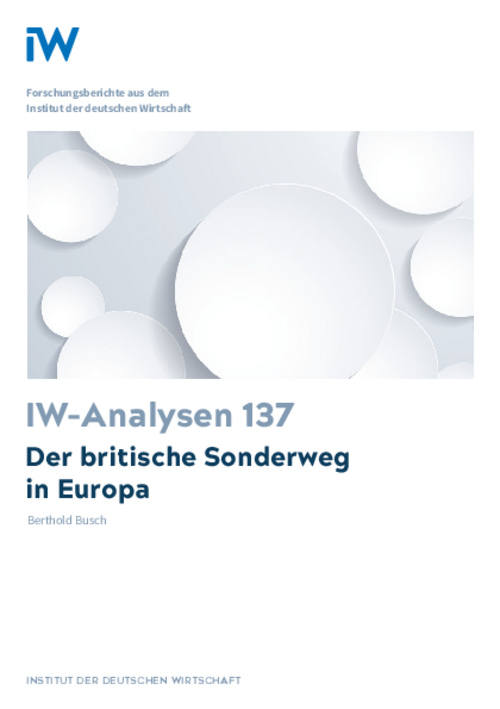On 31 January 2020 the United Kingdom formally separated from the European Union. Having abandoned its role as an outsider in (western) European integration to join the then European Economic Community (EEC) in the early 1970s, the country proved to be a difficult member that was ultimately no longer prepared to support the further deepening of European integration.

The British Go it Alone in Europe
IW-Analyse

On 31 January 2020 the United Kingdom formally separated from the European Union. Having abandoned its role as an outsider in (western) European integration to join the then European Economic Community (EEC) in the early 1970s, the country proved to be a difficult member that was ultimately no longer prepared to support the further deepening of European integration.
However, it is worth remembering that the United Kingdom was a forceful advocate of liberalising economic relations in the internal market and enlarging the European Union. Following their departure, the British are now free to negotiate trade agreements with the rest of the world, which they see as a promising route to economic prosperity. Indeed, even before Brexit, British foreign trade was moving away from the EU and towards third countries. Yet continental Europe is still the island nation’s most important trading partner and both sides must therefore seek a meaningful framework for future economic cooperation. The manuscript of this Analysis was completed in early March 2020.

Berthold Busch: Der britische Sonderweg in Europa
IW-Analyse

More on the topic
![[Translate to English:] Das Gebäude des Weißen Hauses in Washington, D.C. in den Vereinigten Staaten von Amerika. [Translate to English:] Das Gebäude des Weißen Hauses in Washington, D.C. in den Vereinigten Staaten von Amerika.](/fileadmin/_processed_/c/1/csm_GettyImages-2161499385_White_House_Editorial_884306add8.jpg)
Trump or Harris or ...? What Europe must prepare for
A few months before the presidential election in the USA, Donald Trump has a good chance of being re-elected. On the Democratic side, the incumbent president has withdrawn his candidacy after a long period of hesitation, while Vice President Kamala Harris is ...
IW
Compendium 5.5: CO2 Regulation of Road Transport in Europe
With the Compendium CO2 Regulation in Europe, the IW has been providing the interested public with a comprehensive collection of data on the development of CO2 emissions from passenger car traffic in the European Union, as well as on the applicable regulatory ...
IW